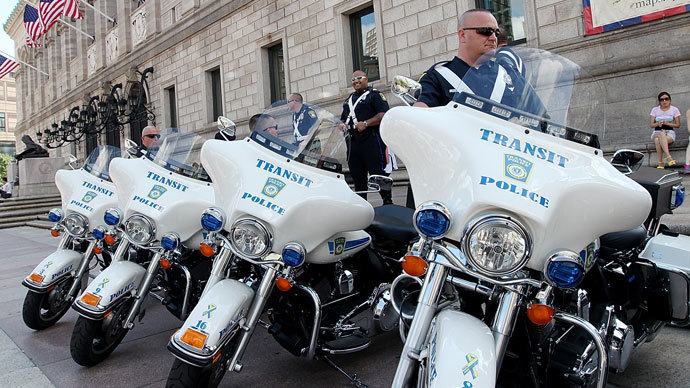Boston police halt license tracking system as media probe points to privacy violations

Officials in the Massachusetts capital have put the brakes on using license plate readers, after inadvertently releasing sensitive surveillance data to the media which probed it and indicated the technology could have been misused.
The Boston Police Department has announced the indefinite suspension of license plate readers (LPRs), following an investigation published by the public awareness group, MuckRock and The Boston Globe, into the possible misuse of the technology.
“We just took [the license plate reader program] off-line while the commissioner reviews it,” said Boston police spokeswoman, Cheryl Fiandaca. Acting Police Commissioner William Evans “wants to review it so he knows that it’s being used effectively and that it doesn’t invade anyone’s privacy,” she added.
In July, the Boston Police Department (BPD) accidentally handed over to the Boston Globe an unredacted list of license plate numbers of more than 68,000 vehicles scanned over a six-month period. Many of the vehicles were tagged by the LPR system dozens of times in that period alone, the Globe reported.
Before the suspension of the program, BPD employed 14 separate LPRs, which allowed them to trace “as many as 4 million vehicles a year”.
Although there is nothing secret about local police forces using LPRs, the released data suggests the technology is not being used for its intended purpose, which is to locate and retrieve stolen vehicles, as well as to keep tabs on vehicles entering and exiting a particular region.
The data provides information on a stolen Harley Davidson motorcycle, for example, that was tracked by police plate readers 59 times over a six-month period. “It was often recorded on sequential days or multiple times in a single day, all by the same scanner and almost always within the same half-hour span in the early evening,” the newspaper noted.
Although the motorcycle was tagged multiple times by the hi-tech LPRs, there was no indication that an order was given to retrieve the stolen property, although each of those scans “prompted an e-mail alert to the department’s Stolen Car Unit”, The Boston Globe reports.
In the post-Snowden era, when online data vacuuming of personal information seems ubiquitous, questions are being raised as to how long and to what purpose motorists’ travel logs are being stored.

The license plate readers collect an abundance of driver information, including the date, time, and GPS location of a targeted automobile. So while the technology could be used, as it is regularly advertised, to return stolen vehicles to their rightful owners, it can also allow police to track a particular motorist’s driving habits.
BPD keeps collected motorist data for 90 days. However, in the event the information “is needed for investigatory or intelligence purposes and for discovery/exculpatory evidence”, the police are empowered to retain the information indefinitely.
Privacy advocates are calling for more oversight into how the license plate readers are used, and how long the data is allowed to be stored.
“It’s not realistic to think that law enforcement will police itself when it comes to technologies like license plate readers,” state Representative Jonathan Hecht, a Massachusetts Democrat who has filed a bill to regulate the technology and the sensitive data the police collect, told The Globe.
Police around the country, however, defend the use of the technology, which has the capacity to read 60 license plates per second. The system then matches plate numbers against a "hot list" of wanted vehicles, stolen cars, or criminal suspects, including “burglars, car thieves, child molesters, kidnappers, terrorists, and—potentially—undocumented immigrants”, the Ars Technica website reported.
The glaring problem with the LPR program is similar to that of the National Security Agency [NSA], and that is its need to scoop up everybody – innocent and guilty alike – in its large net in order to fish out the bad guys.
“It’s clear that in fact the reason that police departments are using this technology might not actually be the reason that they say they’re using it for,” said Kade Crockford, director of the Technology for Liberty Initiative at the ACLU Massachusetts [American Civil Liberties Union]. “We found that in this case that they’re not following up on the stolen car hits and to us that says the only [reason] that it’s being used is to collect huge troves of people’s movements.”
The ACLU recently published a report showing that of the over 204 million license plates captured in the LPR program in Washington DC last year, just 0.01 percent of them registered as being on the “hot list”.












